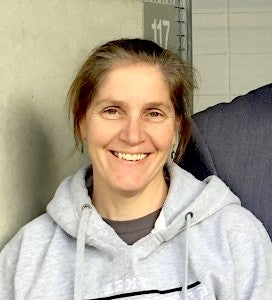By Ross Balding
A Ph.D. candidate in the College of Health Sciences aims to improve the motor skills of those living with Parkinson’s disease and will begin working with local patients next month, thanks to a grant from a national Parkinson’s research and treatment organization.
Christine Clarkin, from the interdisciplinary neuroscience program, along with physical therapy doctoral candidates Morgan McKenney and Brianna O’Grady, have received a grant from LSVT Global to fund a local efficacy study that aims to improve the mobility of patients with Parkinson’s disease. The students seek to develop a local version of the LSVT BIG method, which “trains people with Parkinson’s to move their body more normally,” according to LSVT Global.
LSVT stands for Lee Silverman Voice Treatment, and the original method is called LSVT LOUD. LOUD was created in 1985 with the goal of retraining patients’ mouths to restore the loss in speech ability that Parkinson’s disrupts in many. That same process is now being used to study and treat the decline in motor skills Parkinson’s also causes. The purpose of LSVT BIG is to improve the patient’s movements for “small motor” and “large motor” tasks.
The study is scheduled to begin this month and will include two sets of five subjects from the area, some of whom Clarkin has worked with as a practicing physical therapist for South County Home Health. Clarkin, who already has a doctor of physical therapy degree, plans to use the study as the subject of her dissertation for a Ph.D. in translational neuroscience.
One planned use for the grant money is to purchase smartwatches for study participants to track vital signs like heart rate; measure lifestyle habits like sleep patterns; and help ensure compliance with the study protocols.
“Part of the LSVT BIG treatment intervention is that individuals are required to do a set of exercises twice a day for four weeks,” Clarkin said. “On the days we don’t see them, the smartwatch can help monitor if they are, in fact, doing the exercises. It will also give an overall activity measurement and number of steps individuals have taken, which will help measure the efficacy.”
Another way efficacy will be determined is by a measurement called Brain-Derived Neurotrophic Factor, or BDNF, which is evaluated through blood analysis. BDNF is a protein that helps the body maintain existing neurons and create new ones, so having a higher amount of BDNF could reduce and somewhat counteract the neurodegenerative effects of Parkinson’s. “When we exercise, studies show that BDNF is elevated and this factor is important for brain development and neurological function,” Clarkin said.
The graduate students from the DPT program and Clarkin both hold the certification required to perform the LSVT BIG treatment method. Clinical Associate Professor of Physical Therapy Anne-Marie Dupre and Professor Leslie Mahler will also facilitate the exercise sessions.
“We decided to apply for this grant to involve DPT students as a win-win so that Christine could train and get person power to treat patients for her research, and so that DPT students could obtain treatment efficacy research experience, which is very hard to find,” said Mahler, Clarkin’s major professor.
Ross Balding is a senior journalism major and intern with the Academic Health Collaborative.

